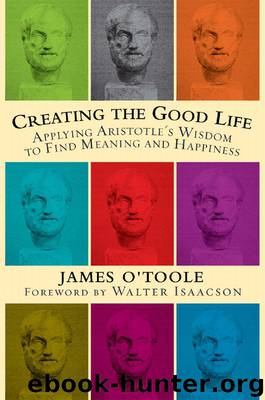Creating the Good Life by James O'Toole

Author:James O'Toole
Language: eng
Format: epub
Publisher: Potter/Ten Speed/Harmony/Rodale
Published: 2005-05-13T04:00:00+00:00
ANOTHER PRACTICAL EXERCISE: KNOWING
WHEN TO “GO WITH YOUR FEELINGS”
As in psychology, the process of philosophical deliberation begins with self-awareness, often with the realization that I am not happy. To Aristotle, as to psychologists, the reasonable man or woman then asks, Why is it I am not happy? Some may answer, I am unhappy because of what others are doing to me. If so, the reasonable person will put herself out of the way of harm from others. Having done that, both psychologists and Aristotelians suggest this person should also ask, What am I doing that makes me so unhappy? And both define folly as doing more of the same: An unhappy man drinks more to make himself happy; an unhappy rich woman seeks more wealth in order to be happy; and so on down the list of things typically expected to cure unhappiness. Instead, both Aristotle and the modern psychologist call trying a new course of action the beginning of wisdom. The Ancient says this is done most effectively by engaging in a planning process in which alternative ends and means are consciously and analytically evaluated.
Let me make this process concrete by way of another example. In early 2002, the great, former basketball player, Kareem Abdul-Jabbar, took a job coaching in the second-tier United States Basketball League. Significantly, he did not blame others for having failed to land a more lucrative and prestigious job in the NBA, where former stars of his caliber are more typically employed. Instead, he acknowledged that he had been a loner in his playing days, dour and standoffish, and that after he retired, he hadn’t nurtured relationships with league owners and officials: “For the longest time, I didn’t want to talk to the press or to management…. I guess I can look in the mirror and only blame myself for that.” At age 54, Jabbar saw the consequences of his own behavior in a way he couldn’t when he was younger, then he committed himself to a course of change.
When I read about Jabbar’s transformation, it dawned on me that throughout my own career, I had behaved similarly. I hadn’t attended professional meetings, hadn’t formed relationships with people who could give me access to the resources needed for an academic writer to succeed, hadn’t done most of the normal and expected things my professorial peers had done to advance their careers. It now occurred to me that this was a major reason I had never been as successful as I had hoped. Like Jabbar, in my fifties, I have been forced to conclude, “I can only blame myself for that.” With this insight, I now have to choose whether or not to change my behavior. Do I want to start schmoosing with people I sought studiously to avoid for 3 decades or keep doing things “my way”? Either way, I have to live with the consequences of my now-conscious choice.
Here’s another instance where psychologists and philosophers part company: The former believe making a choice about
Download
This site does not store any files on its server. We only index and link to content provided by other sites. Please contact the content providers to delete copyright contents if any and email us, we'll remove relevant links or contents immediately.
The Power of Now: A Guide to Spiritual Enlightenment by Eckhart Tolle(5788)
The Miracle Morning by Hal Elrod(4732)
Rising Strong by Brene Brown(4465)
Being Aware of Being Aware by Rupert Spira(3278)
The Secrets to Charisma and Personal Magnetism: Learn a hidden energy tradition to become magnetically attractive and vitally alive by Martins Bruno(2717)
The Lost Art of Good Conversation by Sakyong Mipham(2657)
A New Earth: Awakening to Your Life's Purpose by Eckhart Tolle(2654)
The Gifts of Imperfection by Brene Brown(2577)
The Songlines by Bruce Chatwin(2559)
The Power Of Now by Eckhart Tolle(2231)
All Things New by John Eldredge(2165)
The Nature of Consciousness by Rupert Spira(2109)
The Untethered Soul: The Journey Beyond Yourself by Singer Michael A(2076)
The Empath's Survival Guide by Judith Orloff(2068)
Thoughts Without A Thinker: Psychotherapy from a Buddhist Perspective by Epstein Mark(2029)
The Seat of the Soul by Gary Zukav(2009)
Practicing the Power of Now by Tolle Eckhart(1934)
The Yoga of Jesus: Understanding the Hidden Teachings of the Gospels by Paramahansa Yogananda(1863)
Be Feel Think Do by Anne Berube(1816)
